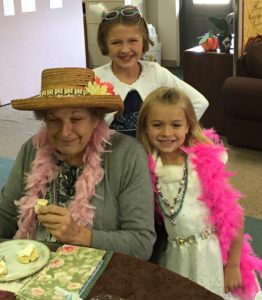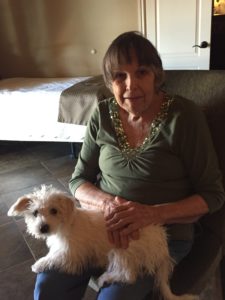Seeing the signs: Care transitions
Physicians and first responders helped these siblings determine when it was time to change their mother’s care situation.
One of the most difficult decisions a family makes is whether they need to change their loved one’s living situation. This may involve hiring in-home care workers, living with a loved one or moving into a care community.
Siblings Rosan Bush and Raymond Babb have made four transitions involving living arrangements for their mother, Loraine. They have shared caregiving responsibilities since Loraine was diagnosed with dementia.
Signs of a problem
About six years ago Rosan Bush and her husband had back-to-back health issues that prevented Rosan from visiting her mother, Loraine. As soon as they were both feeling better, they went to visit Loraine in Blythe, California. When they arrived, Rosan, of Spring Creek, Nevada, immediately knew that there was a problem.
The power and water had been shut off. Loraine had lots of piles and was hoarding items, such as water bottles. There were several burned pans on the porch.
Loraine couldn’t find her dog. After searching the neighborhood, they found the dog in Loraine’s garage.
Rosan learned from neighbors that the fire and police departments has been to the house. But nobody had been concerned enough to reach out to Rosan or her brother.
Rosan got the utilities turned back on and took her mother to see her physician. Loraine initially received a diagnosis of dementia. She has since been diagnosed with Alzheimer’s disease.
Making home safer, with help
Loraine was very independent. She didn’t want anyone telling her what to do. Her children tried to respect her wishes.
Initially, Rosan and Raymond thought that Loraine could continue to live in her home. Rosan and Raymond both lived several hours away from Blythe. It was challenging, because there were not a lot of support services in this small town.
They hired paid caregivers to stay with Loraine during the day, but were not able to find anyone to work the night shift. They installed an alarm system to help alert police/fire if there was an issue.
Signs of trouble
A nephew who lived in town kept an eye out for issues. He reported several visits from the fire department.
Loraine started driving at night and totaled her car, but didn’t tell her children. She took money out of her savings account and bought a new car.
The family disabled the vehicle and told Loraine that it wasn’t working. This kept her from driving, but led to a new problem. She started walking to the grocery store when the caregivers weren’t there. A diabetic, Loraine would walk to the store to buy candy.
On one of these walks, Loraine ended up in the emergency department. The physician in the emergency department let the family know that Loraine was no longer safe to be alone.
Sibling caregiving shifts
At this time the siblings decided to share caregiving responsibilities. Loraine lived with each sibling for six weeks at a time. There were day programs in both communities that Loraine attended a few days per week. Loraine loved her grandchildren and the family pets. She enjoyed gardening.
Several times, Loraine left and tried to go home. In the short time it took a caregiver to go to the bathroom, Loraine would leave the house. At the suggestion of the Sheriff’s Department, they installed locks and alarms on the doors and used a tracking device for Loraine.
It can be difficult when you’re in the middle of caregiving to determine when something needs to change. When Rosan received advice from the emergency department physician or the law enforcement officer, she remembers thinking, “are we that far along” that something needed to change. Sometimes she thought, “it’s not that bad yet.”
Time for residential care
Rosan and Raymond were able to keep Loraine in their homes for about two years. When Loraine began to have incontinence issues, they decided that it was time to find a residential care community for Loraine.
They found a small care community in El Centro, which was close to Raymond. It seemed fine at first but after almost a year, issues arose that concerned the siblings about the care their mother was receiving.
Finding a better fit
Rosan found a new community in Bullhead City, Arizona, near her mother-in-law. Raymond and Rosan had looked at options closer to their homes but the costs were $1,000 to $2,000 more per month than in Arizona.
Loraine has been in her new home a little over a year. She still gets agitated but the staff know her signals and how to redirect her. There is space to walk around the community. As she has adjusted, Rosan noticed that her mom spends more time in the common areas and less time in her room.
Struggling to meet mom’s wishes
The decisions have not been easy for Rosan and Raymond to make. They’d had conversations with their mom about her wishes. Loraine wanted to remain at home.
They tried to make it work for two years after her diagnosis but had to move her to keep her safe.
Loraine had wanted her grandchildren to receive the proceeds from the sale of her home. But Loraine’s monthly earnings are not enough to pay for her care. Rosan and Raymond sold Loraine’s home. Those funds are being used to help pay for Loraine’s care.
Looking back on difficult decisions
Rosan admits that she and her brother have felt guilty about their decisions. But they know that they have been doing what is necessary to keep their mother safe, ensure that she receives good care and protect their own health.
In a caregiver class, Rosan heard that sometimes the caregiver dies before the person who is living with dementia. That piece of information stuck with her and serves as a reminder that she needs to take care of her own health.
Multiple transitions are not uncommon
The transition to the second care community was stressful for the siblings. Rosan has heard from several other families who did not find the right community on the first try.
“We could feel sad that it wasn’t the right place, but that’s not uncommon,” said Rosan. “Something is not a good fit. You know it’s going to be difficult in the moment, but it’s going to turn out fine.”
Rosan continues to make the nine-hour drive every couple of months to visit her mother in Arizona. She is now able to stay with her mother-in-law.
Long-term care needs
The very thought of moving your loved one out of their home can be difficult to consider. It can be especially difficult for spouses to consider this separation. However, there are some situations which may cause care partners to have to make such a decision.
Consider:
- Their safety – Is the person with dementia safe? Perhaps you cannot keep him/her from wandering even with all the safeguards you have in place. Maybe your home is too difficult for the person to maneuver because of stairs. Has your loved one fallen multiple times?
- Others’ safety – Is the person’s behavior such that you cannot be comfortable with him/her around your young children? Alzheimer’s may cause the person to become very angry or suspicious. Are people afraid to be with him/her? Is your own safety at risk?
- Your health – Is your health at risk? Are you overwhelmed with caregiving, household chores, your job and/or parenting? Are you unable to sleep through the night because the person gets up and wanders at night? Is your own health declining?
- In-home care issues – Have you tried in-home care and either it was too expensive, or the person with dementia simply refused to have a “stranger” in the house and fired the worker?
- Professional guidance – Has a healthcare provider, social worker or first responder (e.g., fire or police officer) expressed concern about your loved one’s living situation or your health and safety?
Every situation is different and what one care partner might choose may not be possible for another. You and your family need to decide what is in the best interest of your loved one and the care partner(s).
No judgments should be passed on those who are unable to continue caring for someone at home. Caregivers have responsibilities to a number of people, including themselves.
We have resources to help you consider these difficult decisions. Call our 24/7 Helpline at 800.272.3900 or visit our caregiving center.
Learn more:




















